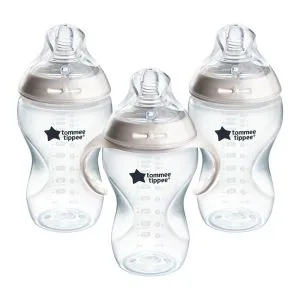You may find that your child suddenly rejects a certain food that they've previously enjoyed out of the blue. They may also refuse a certain food if they're:
- feeling sick or tired
- in a bad mood or feeling upset
- being force-fed when they've had enough to eat
- too full of drinks they had during the day
- constipated
Eating is a very sensory experience and there are lots of reasons why a child may become picky and not eat certain foods. It's quite common for toddlers to develop a fear of new foods (known as food neophobia) and it can help to consider the following points if your child is showing signs of fussiness:
- Have they had a traumatic experience with food like choking or being sick after eating something? This can affect how they feel about eating and mealtimes.
- Has their routine changed? This can have an impact on their eating pattern and cause them to refuse foods offered in a different way, at a different time, or in a different place.
- Can you spot any patterns in the foods your child likes and dislikes? Consider textures, temperature, smell, and color. Remember that what smells good to you may be unpleasant to them.
How to help picky eaters
Although it's not possible to stop your child from becoming a fussy eater altogether, there're some steps you can take to make the ride a little smoother. Once you know what your little one doesn't like to eat, you can develop a plan to help them overcome their fussiness. The following tips may help.
Start early
It can pay off to introduce a variety of flavors and textures early on in your baby's weaning journey before they form strong opinions on what they do or don't like.
Eat together
Little ones learn by copying, so it's a good idea to lead by example and eat with them as often as you can. Sit down together and chat while you eat. That way, they'll be more likely to enjoy new foods and learn that mealtimes can be fun and aren't just about eating.
It can also help to ask someone else that your child likes and looks up to eat with you. As frustrating as it is, children will sometimes eat for someone else, such as a grandparent, aunt, or uncle, without any fuss.
Get them involved in meal prep and give them some choice
Letting your little one get involved in preparing their meals can help them to feel more in control of what they eat. You can get them to lend a hand with shopping, picking recipes, getting food out of the fridge, washing the fruit and veggies, and cleaning up.
It's also a good idea to show your little one the ingredients of their meal first before it's chopped and cooked. That way, they know what they're eating, and understand more clearly what's on the plate in front of them.
Be patient and positive
When you're going through a fussy phase with your little one, patience and positivity are important.
Try to avoid using negative language when you talk about food. Also, remind yourself that most little ones make it through the picky phase with time and grow up to enjoy a wide range of healthy foods.
Keep portions small
Little ones can sometimes become overwhelmed if they're presented with a big plate of food. So, it's best to give small portions and always praise them, even if they only eat a little.
Make their food and mealtimes fun and interesting
Even though it can get a little messy, it's a good idea to let your child play with their food as much as possible.
Having fun at mealtimes will keep them relaxed, and they'll be more likely to try new things. Why not let your inner-artist shine and arrange their food into a playful picture or a funny face on their plate?
Hide vegetables in their meals
If you know that your child tends to be particularly fussy about eating their veggies, it can help to hide them in their meals. Sneaky, but often successful!
To do this, you can try:
- Making thick blended soups filled with lots of veg.
- Making omelettes and including chopped up veg.
- Blending veggies like carrots, mushrooms, and onions into sauces.
- Putting a layer of wilted spinach into lasagne.
Limit drinks
If your little one is drinking a lot of fluids during the day, their stomach may feel full, and they'll be less likely to want to eat when it comes to dinner time. Try to avoid giving them a drink for around thirty minutes before a meal or snack time. Instead, encourage them to slowly sip their drink towards the end of their meal or snack.
Make sure they're hungry
You may think your little one is refusing their food because they're being fussy, but it might be that they're just not that hungry at that moment in time.
It can be tricky to know exactly how much food to offer your little one, but toddlers will let you know that they're full and don't want any more food by:
- Keeping their mouth shut
- Saying "no" or turning their head away
- Pushing away their spoon, bowl, or plate
- Refusing to swallow food or spitting it out
- Leaning out of their highchair or trying to climb out
- Crying, screaming, or retching
If they're showing these signs of being full, try to stay calm and simply take their plate away, even if they haven't had very much. Let them down from the table and remember that you can always try again a little later.
By allowing them to eat only until they're full, you'll encourage them to be independent by listening to their body and appetite.
Fussy eating help: Things to avoid
Now let's cover the things you should avoid doing when dealing with a fussy eater.
Don't force them
There's nothing wrong with a little gentle encouragement, but you should never force your child to try a food that they don't want to. You should also never insist that they finish everything on their plate.
Remember that change takes time and there will be lots of other opportunities for them to try new foods.
Don't bribe or use food as a reward
It's best to steer clear of bribing your little one into eating something they don't want to, as this can lead to them avoiding it even more in the future. Rather than coaxing them, offer new foods in a relaxed way and give them lots of praise when they're brave enough to try them.
If your little one to thinks of sweets as nice and vegetables as nasty, their fussiness may get worse. Try to reinforce that all food is tasty and there to be enjoyed rather than using certain foods as a reward for good behaviour.
A good alternative is using a sticker reward chart every time they try a new food or finish what's on their plate. Then, once they've got a chart full of stars, reward them with a prize.
Avoid offering an alternative after you've cooked
It can be tempting to keep offering alternative meals until your little one eats something. But this can be very draining and time-consuming. Plus, they'll likely learn to take advantage if you give them their favourite food whenever they refuse to try something new.
To reassure you that they're not going hungry, it's a good idea to always include one food that you know they'll eat in each meal.
Limit snacks between meals
Try not to offer your little one too many snacks during the day. If they eat too many, they'll fill themselves up and not be hungry when it comes to dinner time. Around two healthy snacks a day should be plenty.
Make sure mealtimes aren't too late
Your little one is less likely to want to eat if they're tired or overly hungry. So, try not to leave their meals too late, and stick to a regular schedule where possible.
Don't assume a refusal is forever
As your little one grows, their tastes and food preferences will change.
Even if they've refused a particular food in the past, they may come to like it in the future - so don't lose hope! Sometimes children need to be offered a new food 10 times or more before they feel confident enough to try it.










